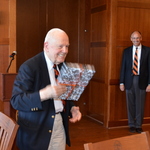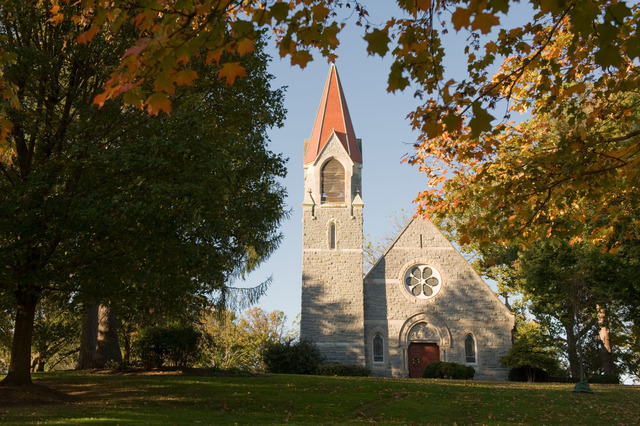 |
Part of the beautiful McDonogh campus. This is the Finney Building, named
after a former Board Chairmen, whose grandson John was my roommate my
freshman year at Princeton.,before I joined thr Navy and John the Marines in
World War II. |
I had an idyllic boyhood, growing up on the beautiful campus of
McDonogh School, where my father was athletic director, head of the math department, and coach of the varsity football, hockey, and baseball teams. It was an all-boys, semi-military school at the time, spread over 1000 acres in the rolling countryside about fifteen miles northwest of Baltimore, Maryland.
 |
My prize for being the oldest returning
alum was a framed copy of "The
McDonogh Uniform," which in the
olden days every student had to
memorize. Standing behind me is
Headmaster Charles Britton. |
I returned to the campus this past weekend to attend my 75th class reunion. As it turned out, I was the only representative of the class of 1942 and, to my surprise, the oldest alumnus present for the event. After being so recognized at an early gathering, I was treated as something of a” phenom” (that’s a kinder word than “relic”) by the younger alums and current faculty and staff, who could not have been more attentive and helpful.
Having entered McDonogh as a second grader in 1931, I was asked many questions about the way things were way back then, and although I loved my eleven years as a cadet, I could honestly and enthusiastically assure everyone I talked with that McDonogh has come a long way since then. McDonogh ended its military program in 1971 and became coeducational in 1975. It is an amazing school of close to 1400 students , with an outstanding full-time faculty of about 180 extremely dedicated teachers, an expansive and beautifully landscaped campus with sprawling athletic fields and superb facilities. Having been founded originally as a school for poor boys, McDonogh continues to maintain a need-based scholarship program of several million dollars annually for worthy boys and girls.
What is most impressive and heart-warming to older alums like me is that the school has maintained its commitment to the ideals of its founder, John McDonogh. Students, faculty, and staff are imbued with the core of its mission, which is, in the founder’s words, "to do the greatest possible amount of good.” Every aspect of their educational experience is geared to prepare the students for life and to make a positive difference in the world. What a refreshing atmosphere that shared purpose creates for the entire McDonogh family; the McDonogh spirit is palpable.
I attended every key event, walked all over the campus, visited with teachers and students, and inwardly reminisced about the days when I was climbing some of those same trees and playing on those same fields. I cannot adequately express what I was feeling throughout the reunion – so many long buried experiences vividly recalled, the faces of so many beloved teachers and friends appearing clearly to my mind’s eye, so many memorable moments.
One of those unforgettable moments was the morning of December 8, 1941, when Major Louis E. Lamborn, our awe-inspiring Headmaster, at a specially called assembly of the Upper School, interpreted the instantly life-changing significance of the attack on Pearl Harbor. With trembling voice and tear filled eyes he expressed his assurance that we McDonogh boys would serve our country well in the war from which he knew some of us would not return alive.
 |
| Tagart Chapel, where I attended vespers as a seven-year-old |
All of the reunion events were well planned, expertly conducted, and meaningful. Perhaps the most moving for me was the memorial service in the lovely stone chapel, when the roll of all the alumni who had died in the past year was solemnly read. The student choir sang beautifully, and I was vividly recalling the times I had lead services there, including the memorial service for my older brother Herb, who graduated from McDonogh in 1936. My thoughts ranged all the way back to my earliest days at the school, when as a seven-year old boarder I sat in those same pews at the Sunday vespers. Many years later I came to realize that for me the seeds of faith were sown in Tagart Chapel, which is now the oldest building on campus.
On the drive home I had time to process my three-day experience at McDonogh. I was so happy and grateful that I could be there for what was a most amazing reunion. There was really no one for me to “reune” with, but I mingled with many wonderful fellow alumni and alumnae, whom I had never met, and a handful with whom I had overlapped a few years but didn’t really know well, since they were several years younger than I. Even so we had things about which we could reminisce a bit. Indeed, I felt connected with everyone there, for we all had McDonogh in common, and we celebrated each other’s unique experiences.
It was, of course, a nostalgic, sentimental, wistful time for me, as I thought of the days long gone by. But it was also an exciting, encouraging, and extremely positive experience, as I listened to the hopes and dreams of the students and faculty, and marveled at the commitment and enthusiasm of every member of the staff. They were all immensely happy and grateful to be part of the McDonald family.
Overall it was what I would call a sad-happy time for me – happy because of the sheer joy of experiencing the McDonogh of today, sad because I was missing the wistful days of long ago and all my long lost friends. Sad, too, because I was all the more aware of my own mortality and wondering how many more reunions I’ll be able to attend.







